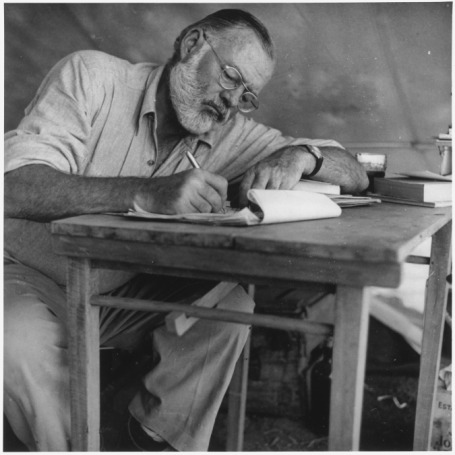
Lately, I’ve been reading Shakespeare to my daughter. Based on the number of times she farts during said readings, Macbeth is her favorite. (She’s one month old, by the way.)
Anyhoo, all this Shakespeare got me thinking…what would the world look like without him? And I don’t mean the conspiracy theory Shakespeare-didn’t-write-his-own-plays thing. I’m wondering how different our lives might be if the Bard never existed.
So, in a world without William Shakespeare…
…Amanda Bynes, Julia Stiles, Channing Tatum, Joseph Gordon-Levitt, and Heath Ledger Wouldn’t Be Famous
Follow me closely here. Amanda Bynes and Channing Tatum starred in the 2006 romantic comedy She’s the Man, a film which kickstarted both their careers. Likewise, Julia Stiles, Heath Ledger, and Joseph Gordon-Levitt rocketed to stardom thanks to their roles in the 1999 romantic comedy 10 Things I Hate About You.
And what do both these films have in common? They’re modern adaptations of Shakespeare’s plays!
She’s the Man is adapted from Twelfth Night and 10 Things I Hate About You is adapted from The Taming of the Shrew, in case you were curious. So, without the plays, we wouldn’t have the movies. Without the movies, we wouldn’t have the star-making performances. And without the performances, we wouldn’t have the stars. That means no Ledger’s Joker in The Dark Knight, no Stiles’s Nicky Parsons in the Bourne films, and no Tatum’s Magic Mike in Magic Mike.
Well, I suppose we’d get along without that last one. But I know my wife would be disappointed.
…We’d Be More Skeptical of People Getting Married After Barely Knowing Each Other
I mean, I suppose we already are skeptical of that. But nobody would rationalize it by saying, “It’s just like Romeo and Juliet!” This means dating shows like The Bachelor wouldn’t exist, and we’d all be better off.
…There’d Be a Hole in Lesson Plans for English Classes
Speaking of Romeo and Juliet, we spent weeks on that play in high school. We also read Julius Caesar. And once I got to college (shoutout to all the Ithaca Bombers) I took an entire class devoted to Shakespeare. Without him, what would all our English teachers do?
They’d probably teach more Steinbeck, which would be terrible for us all. I’d like to thank Will for sparing me that fate.
…Ray Bradbury’s 1962 Novel Something Wicked This Way Comes Would Need a New Title
That’s because Ray borrowed the phrase from Macbeth. It’s a far better title than, say, Evil Carnies Attack!
…The 2011 Disney Film Gnomeo & Juliet Wouldn’t Exist
To the disappointment of nobody.
…Led Zeppelin’s “Stairway to Heaven” Would be Short a Second Line
That’s because Robert Plant paraphrased Shakespeare’s line “All that glitters isn’t gold” from The Merchant of Venice. Might I suggest “All those wrinkles mean you’re old” as a replacement?
…We’d Be Without Tons of Other Useful Phrases, Too
No more “it’s all Greek to me,” which comes from Julius Caesar, and which is often employed by non-Magic: The Gathering players when Magic players say stuff like, “Tap out, kill your blocker, swing for lethal.”
No more “wild-goose chase,” which comes from Romeo and Juliet. Tough to invent a substitute for that one, since “Uncontrollable pheasant pursuit” just doesn’t have the same ring.
No more “break the ice,” which comes from The Taming of the Shrew. This absence would leave college orientation leaders and first-time Tinder dates bereft of an important concept.
…English Would Have Far Fewer Words
To demonstrate my penultimate point, here’s a brief story for you:
I was undressing in my bedroom, inwardly questioning whether or not my outfit was fashionable, when I heard something downstairs. It wasn’t inaudible, but it was close; a lonely yelping, just on the edge of hearing.
So of course I hurried downstairs, my heart thumping, and when I turned the corner, I saw something obscene: An alligator eating my breakfast. The damn thing must’ve slipped through the open window!
“Well aren’t you nervy?” I growled.
The alligator only shrugged. “I may be jaded, lonely, and even a little zany. But at least I’m not totally worthless—unlike that outfit you’re wearing. I don’t mean to be a critic, but really, honey. Hey, do you have any skim milk?”
Look, I know alligators can’t shrug or speak, and they might be lactose-intolerant. But that’s not the point of this exercise. Here’s the same story again, minus the words widely credited to Shakespeare:
I was _____ in my _____, inwardly _____ whether or not my outfit was _____, when I heard something _____. It wasn’t _____, but it was close; a _____ _____, just on the edge of hearing.
So of course I _____ _____, my heart thumping, and when I turned the corner, I saw something _____: An _____ eating my breakfast. The damn thing must’ve slipped through the open window!
“Well aren’t you _____?” I growled.
The _____ only shrugged. “I may be _____, _____, and even a little _____. But at least I’m not totally _____—unlike that outfit you’re wearing. I don’t mean to be a _____, but really, honey. Hey, do you have any _____ _____?”
He also invented the word “puking,” which I’m grateful for.
…We’d Be Missing Some Stellar Insults
I’ve never called anyone an “elvish-mark’d, abortive, rooting hog,” but someday I might need to.
…The World Would Be Far Less Interesting
Thank you, William Shakespeare, for all the plays, phrases, insults, and more. The world could’ve done without The Bachelor franchise, but to borrow a phrase from you, all’s well that ends well.
Kyle A. Massa is a comic fantasy author living somewhere in upstate New York with his wife, their daughter, and three wild animals. His published works include two books and several short stories. When he’s not writing, he enjoys reading, running, and drinking coffee.





